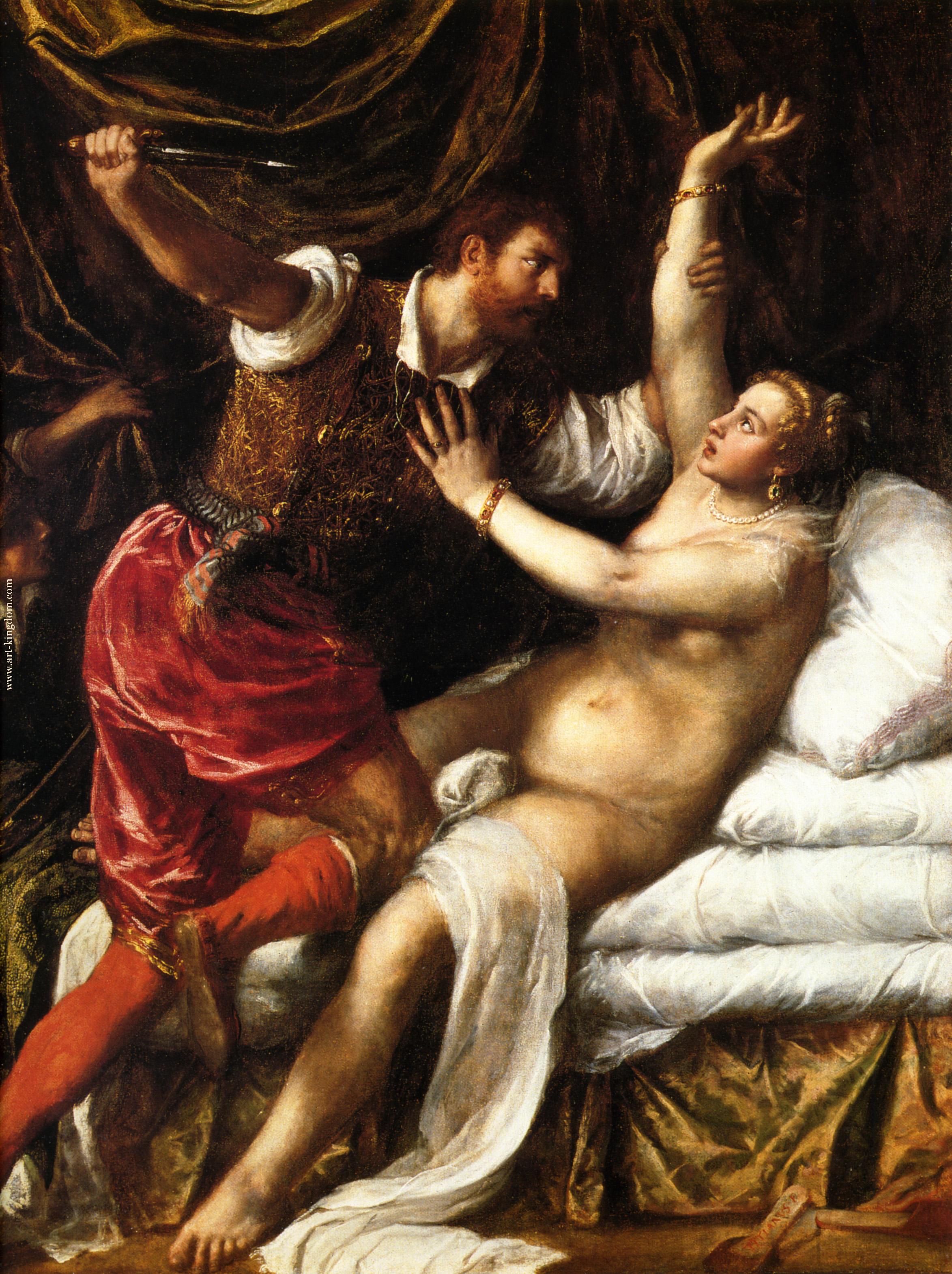Trigger Warnings have no place in education
written for The Spectator, 26 May 2015

Titian’s Rape of Lucretia, at the Fitzwilliam Museum
I get defensive when feminists are accused of being prudes. There’s nothing prudish in critiquing a monotonously promiscuous culture; in despairing of unrealistic body standards, or believing, as I’ve argued before, that porn is healthy, even necessary, when it’s privately stashed under the mattress, but doesn’t belong on the high street.
Then a bunch of students does something so reactionary in the name of feminism that we may as well scatter séance candles about the university library and revive en masse the spirit of the Victorians. At Columbia University – where Emma Sulkowicz’s campaign for redress against an alleged rapist has inflamed debate about universities’ approach to sexual assault – four undergraduates have called on tutors to include ‘trigger warnings’ before assigning students the classic texts that have shaped our culture.
Lest you think this a media storm in a teacup, I can attest it’s an attitude that was well-entrenched when I was active in feminist circles at Yale: in our women’s centre, we once held a discussion on whether Shakespeare’s Rape of Lucrece should be banned from the syllabus. It also took me back to my days at the decidedly fustier Oxford, where you could still skelter into the college library to pick up a copy of Martial, bolt back to your room to start work on that long-behind essay crisis, and only then realise that you’d grabbed one of the many vestigal Victorian editions, which excised all the naughty bits. (Which were, of course, crucial to your essay).
In the days of ‘bowdlerising’ (coined for that deplorably family friendly editor of Shakespeare, Thomas Bowdler), Ovid was always the most dangerous author, with his inherently chaotic view of the world, rapes, reincarnations, intersex transitions tumbling over each other. No wonder that again he’s the first author our Columbia columnists ‘call out’ in their complaint. Yet it took a female scholar, Emma Garland, to give us one of the first unexpunged translations of his Heroides: in 1842 she promised ‘to give the most pure and delicate English that strict fidelity to her Author would allow, to every idea and line contained in his Love Letters’ – i.e. a faithful translation of every priapic innuendo. Would that modern feminists followed her example.
Because fundamentally, ‘trigger warnings’ remain tools for censorship, at least as they’re used by Columbia’s undergraduates. I use the phrase ‘trigger warning’ myself, to warn Facebook friends or Twitter followers that they may not wish to click on a link because it is likely to automatically ‘trigger’ flashbacks for survivors of trauma. There’s a place for such monitory warnings, especially in mass entertainment: the rape survivor who curls up for an evening’s relaxation with Sky Atlantic may quite reasonably want to switch off the TV before the next Game of Thrones episode. But for the serious student of world literature, Ovid is not an opt-out. He shaped the very parameters of the sexual culture feminists should be resisting. And you can’t resist unless you understand the enemy.
There is no question: Ovid eroticises rape. But like the best poets, he constantly undercuts and critiques himself – if Columbia’s feminists cared to read, they’ll find he’s got a bit to say himself about artistic exploitation of sexual assault. One abiding model of a great artist in Metamorphoses is Arachne, the weaver. When the goddess Athene, insulted by Arachne’s boasts, challenges the mere human to a contest of skill, Arachne still doesn’t stop confronting tyranny: she presents Athene with a series of tapestries depicting her fellow gods, especially her own father Jupiter, torturing and raping human women. Even in their horror, Arachne’s depictions of Jupiter’s worst excesses are still works of exquisite beauty – it takes subtle art to be honest about how attractive our darker desires can be. Deny these depictions have power, and you exit the conversation.
I’ll never forget a school trip to Hampton Court, when I was about 14. Late on, I found myself enthralled by a Titian painting of Lucretia, the Roman heroine best known to us through Ovid, Livy and Shakespeare. Like modern ‘honour’ victims, Lucretia commits suicide to prove her chastity after being raped. I stayed riveted, unable to move from this image of violated beauty, the nude rape victim, every curve of her body exposed to the viewer.
I became aware of another watcher, a male teacher, equally entranced. I squirmed, knowing my experience was different from his: we could both be the voyeur, but only I was also being forced to imagine my own body on the slab. Should I have demanded a ‘trigger warning’? Of course not. I did the reverse. I decided then and there that I would spend the rest of my life studying Ovid and Shakespeare. I knew then what I know now: they remain essential guides to life as a woman.




